They overwhelm fields and front lawns. Everyone is so annoyed by the yellow flower that grows on their lawn. They spend time plucking it up by its roots never realizing it’s a medicinal plant. This “weed” is considered to be over 30 million years old first growing in Eurasia.
The entire dandelion plant can be consumed and it’s safe to do so. The dandelion can be eaten raw, baked, or infused into a cup of tea. The benefits of dandelion tea vary with what part of it you are using. I’d be careful using the dandelion plant from a yard in case the yard may have been treated with pesticides. In any case, what is dandelion tea good for?
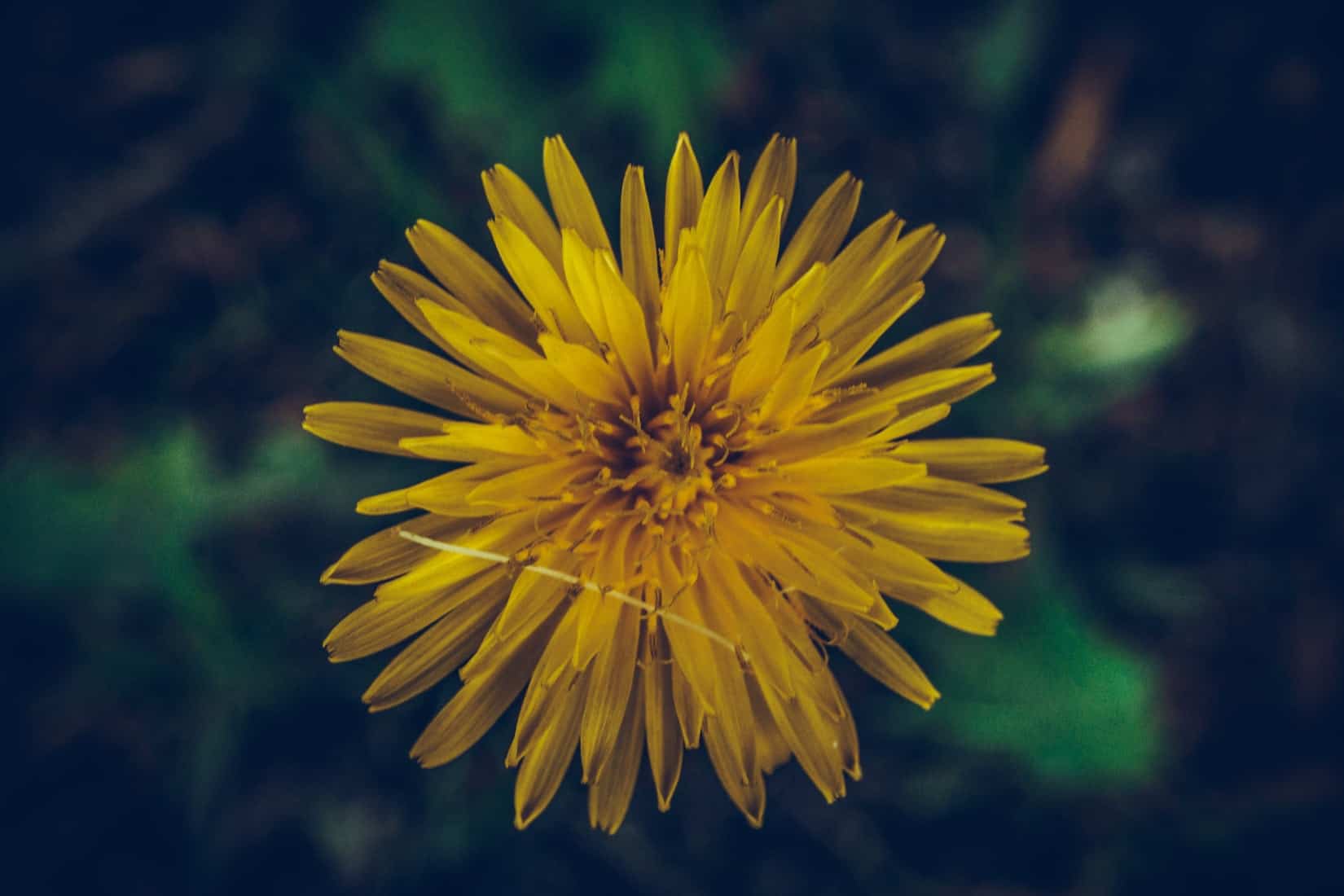
Dandelion
The Dandelion name came from a 15h century French surgeon. The surgeon known as Master Wilhelm thought the leaves resembled a lion’s teeth. Dandelion is French for dent-de-lion or lion’s tooth.
There are two species of Dandelion T. officinale and T. erythrospermum.
Dandelion (Taraxacum officinale) is the unassuming powerhouse of herbal medicine.
Another name for dandelion is Priest’s Crown.
And in Chinese Medicine Dandelion is referred to as Xin Xiu Ben Cao or Pu Gong Ying. The Chinese consider dandelion tea to be sweet, cooling, drying, and bringing energy.
Dandelion, also known as a lion’s tooth, is a yellow flower that grows wild in fields. The “weed” grows much of the year all over the world, and many consider it a common weed. The dandelion closes up when it is cloudy or at night, and looks a bit like a pig’s nose. In some cultures, it is known as a “swine’s snout” because of this unique feature
The dandelion has long shiny grooved leaves with jagged edges. The leaves cluster towards the center of the plant. When it rains the water is drawn towards the center of the dandelion plant and down to the root. In the spring long hollow stems surface from the center of the leaves. The plant then blooms into the bright familiar yellow flower. The shape of the dandelion makes it a self-watering wonder.
Have you ever taken the seedy dandelion, close your eyes, and as you blew all the white fluffy seeds? Blew the seeds all over your neighbors’ lawn making a wish? I know I did.
Made from dandelion root, hibiscus, Ceylon, and cinnamon, this dandelion tea is a deliciously refreshing, naturally caffeine-free coffee alternative
What is dandelion tea good for
The dandelion is that beautiful and frustrating flower that grows in your yard. You know the one, that has a yellowish center and several yellow long petals coming from the center. The stem is long and can be purple or green. As the season progresses the petals fall from the plant. The yellowish center turns into a ball of fluff or seeds. The wind captures and blows the seeds it contains through the air
The Amish use dandelions to make dandelion wine. The wine is used to make a tonic. The tonic is for medicinal purposes only. It is added to tea to give energy and detoxify the body when you become ill. Dandelion tonics can be bitter, it’s that bitterness that helps heal the organs as well.
High in Antioxidants – Helps defend the body against the negative effects of free radicals.
Rich in Fiber – Can act as a mild laxative.
High in Calcium (K2) – Dandelion Tea contains vitamin K, this may be a better choice than calcium for bone health. Calcium can cause stiffness in arteries, which can increase the risk of blood clots
High in Vitamin K – Helps with blood clotting and bones, blood clotting abilities that help with menstrual bleeding.
Prebiotic-rich source of prebiotic fiber inulin.
Vitamin A – helps maintain healthy vision, healthy skin, and more.
Dandelions contain several minerals. These minerals aid the body with healing like iron, calcium, magnesium, and potassium.
Some think of dandelion as a common weed, but our herbalists know that its bitter taste stimulates digestion and supports your body’s natural detoxification process.
Dandelion tea benefits
Dandelion Leaves
Dandelion greens come from the leaves and can be steamed, sautéed, or even eaten raw. Dandelion leaves offer beta-carotene, thiamin, riboflavin, calcium, iron, zinc, and magnesium. Dandelions have more potassium than bananas. They contain more vitamin A than carrots and more protein than spinach.
Dandelion leaf is also a source of antioxidants. This supports cardiovascular health. Phytonutrients like alkaloids, steroids, triterpenoids, as well as kynurenic acid. These all help support digestive health.
The antioxidants promote normal lipid profiles. This helps the body neutralize blood sugar. It also helps protect the liver against oxidative stress.
Anemia – Dandelion leaves contain iron and Vitamin C. Vitamin C helps the body absorb the iron.
Constipation – Acts as a mild laxative. Also by removing bile in the system as an antitoxin and increasing bowel movement
Digestion – The bitters activate the digestive system and encourage digestion and prevent indigestion.
Diuretic – Reduces water in the body by increasing urine output and removing uric acid
Unlike most diuretics dandelion actually replaces the potassium not delete it.
Weight Control – I always resist posting this for any tea. I will include this study that shows how the dandelion could help weight loss. It helps the body break down fatty acids. Fiber and the breaking down of fats to move through the body easier.
IMPORTED 100% RAW FROM Bulgaria - This bag contains certified organic, 100% raw cut, and sifted dandelion root from Bulgaria.
Dandelion Root
The nutritional content of dandelion extends to all parts of the plant. It’s a rich source of many vitamins, minerals, and fiber. Dandelion root is often powdered and roasted for use as a coffee substitute or added raw to herbal teas.
The Dandelion root is listed in several periodicals.
- United States National Formulary
- Pharmacopeias of Austria and the Czech Republic
- The Ayurvedic Pharmacopoeia
- British Herbal Pharmacopoeia
The root is bitter and can be very effective as a digestive tonic. It cools and calms the body and soul.
Joint Pain – Dandelion detoxifies the toxins that accumulate in the joints. It helps remove inflammation and pain.
Detoxifying – Dandelion removes toxins like pesticides, pollutants, contaminants, wastes, and toxins that collect in your joints.
Digestion – The root of the dandelion plant shows it can be healed by increasing appetite and soothing digestive issues.
Liver Tonic – Helps to detox the liver and the ability to increase bile and urine. Has been used in China and India for all liver complaints including hepatitis and jaundice.
Mood Swings – Chinese medicine states that when the liver is hot that is when you get mood swings. Dandelion cools the liver and removes toxins that could be influencing your mood.
Prostate Cleansing – Diuretic and Antibacterial use to cleanse the prostate.
Rheumatism – Dandelion is anti-rheumatic.
Urinary Tract – Good for the Urinary Tract and infections. Dandelion has been used as an ingredient in patent medicines and has been used to dissolve urinary stones.
Gallstones – Dandelion root has been used to dissolve gallstones
Diabetes – Helps the pancreas secrete insulin and keep blood sugar levels low.
Here are a few more examples of the healing power of dandelion teas
Skin Problems – Because of its detoxifying nature. Use it as a salve on your skin for dry itchy skin conditions.
Eye problems – Because of its detoxifying nature
Coffee Substitute – For those looking to remove coffee from their diet, its brown color and roasted flavor can be a good trade.
A new “superfood” drink. Dandelion is catching the attention of those wanting to replace coffee. An herbal drink made from roasted dandelion root. Said to taste like coffee but have the health benefits of dandelion tea.
Diverticulosis – Because of its high fiber content.
Kidney Stones – Dandelion tea rids the body of waste and drinking 3 to 4 cups a day can help ease the symptoms of kidney stones.
Viral infections – Some people have used dandelion tea to treat viral infections.
Natural Cancer treatment – Reducing the risk of prostate, colon, stomach, nasal and oral cancers. (see notes at end of the article)
Muscle aches and Joint Pain – Dandelion contains essential fatty acids, antioxidants, and phytonutrients. These all reduce inflammation throughout the body. This can relieve pain and swelling.
Bone Protection – Calcium contained inside the dandelion is 10% of your daily needs
Tooth Decay – Calcium in the dandelion plant helps to strengthen your teeth
High Blood Pressure – Dandelion Tea as a diuretic rids the body of excess fluid, which can lead to lowered blood pressure
Calcium deficiencies – Dandelion Tea contains vitamin K, this may be a better choice than calcium for bone health. Calcium can cause stiffness in arteries, which can increase the risk of blood clots
Eczema – (not as a tea) – Dried dandelion root is often ground into a paste and mixed with water. Creating a soothing paste for skin disorders like acne, eczema, psoriasis, and rashes.
Bruises – Dandelion root is anti-inflammatory, and can also improve blood circulation. These may help to reduce the appearance of bruises.
So it’s easy to wonder what dandelion tea is good for considering its bad reputation as a weed. But like most things, nature had another plan.
In 1957, Ray Bradbury published his most famous work, "Dandelion Wine", a series of short stories that follow a family through summer. The book's title comes from a recipe, (which we'll share in just a moment), that serves as a metaphor for fitting all the happiness of summer into a bottle.
How to grow and brew your own dandelion
How to grow Dandelions
The dandelion seeds are inexpensive and can be sown in early spring in well-drained soil.
Dandelion will grow anywhere. Dandelion will produce more substantial roots in moist, rich, deep soil. The most important part is to make sure your plants will not be sprayed with any chemicals.
- Plant in the soil around 1/4 inch deep in single rows.
- The dandelions will begin to bloom in 85-95 days.
- You can begin to harvest the leaves and flowers at that point and throughout the season.
- Harvest the root in the fall after the 2nd year of growth.
- After harvesting, the dandelion roots are dried, chopped, and roasted.
The roots are then ground into granules. They are then steeped in boiling water to produce dandelion tea.
Growing dandelions is easy. While you may be tempted to use the ones growing in your neighbors’ yard. Resist because those plants may have been exposed to lawn chemicals. Pick them instead of a mountain meadow or abandoned lot. You can also buy dandelion products from a local health food store.
How to Make Dandelion Tea (Tisane)
Dandelion tea can be made from the root, flower, or leaf. Each with a different flavor profile and brewing instructions. Dandelion root tea, for example, is an inexpensive coffee substitute.
Beyond that, it’s simple
Pick, Clean, Prepare, and steep! Oh yes, and ENJOY!
Dandelion tea can be consumed up to 3 times each day.
Suggested daily servings are:
- Fresh Leaves – 4-10 grams
- Dried leaves – 4-10 grams
- Fresh roots – 2-8 grams
Roots:
Dig them out deep. Wash. Chop into small pieces, heat an oven for about 2 hours, then use 1-2 teaspoons steeped for 10 minutes. It can be stored in the refrigerator for up to a week.
Dandelion Root Tea
- 0.5 to 2 teaspoons (2 to 8 grams) of dandelion root in a cup.
- Pour 1/2 to 1 cup of water over
- Steep for 10 to 15 minutes
The longer you steep the stronger your tea will be
- Strain out the dandelion root
Let it cool and ENJOY!
Dandelion Leaf and Flower Tea
To make dandelion leaf and/or flower tea. Take a small handful of dried dandelion leaves/flowers (discard any large stem pieces)
- Crush into small pieces
- Place 1-2 teaspoons into an organic teabag, reusable tea ball, tea infuser, or French press.
- Steep 15-20 minutes (leaves and flowers)
- Add water at 175 °F
- Pour your hot water into a teacup or mug and add your teabag.
- Steep for 5 minutes and remove the dandelion
Serve dandelion tea hot or cold
You can add sweetener to your tea. You can always add stevia or Lakanto (monk fruit). Adding fruits or citrus to your tea can help soothe the bitter taste you may get from the dandelion.
Does Dandelion Pose Any Risks?
If you decide to start to drink any herb. Either for its healing properties or to enjoy. It is always best to consult a physician if you are on any medications.
Allergic Reactions – While there are not a lot of risks with dandelion tea. You must always be careful of allergic reactions to anything new introduced to the body. If you are already allergic to ragweed, daisies, chrysanthemums, or marigolds. Dandelion tea may cause an allergic reaction as well.
Antibiotic interaction – Dandelion tea may decrease the effectiveness of any antibiotics you may be taking.
A negative effect of certain medications – Can interact with certain drugs: lithium, Cipro, and some diuretics.
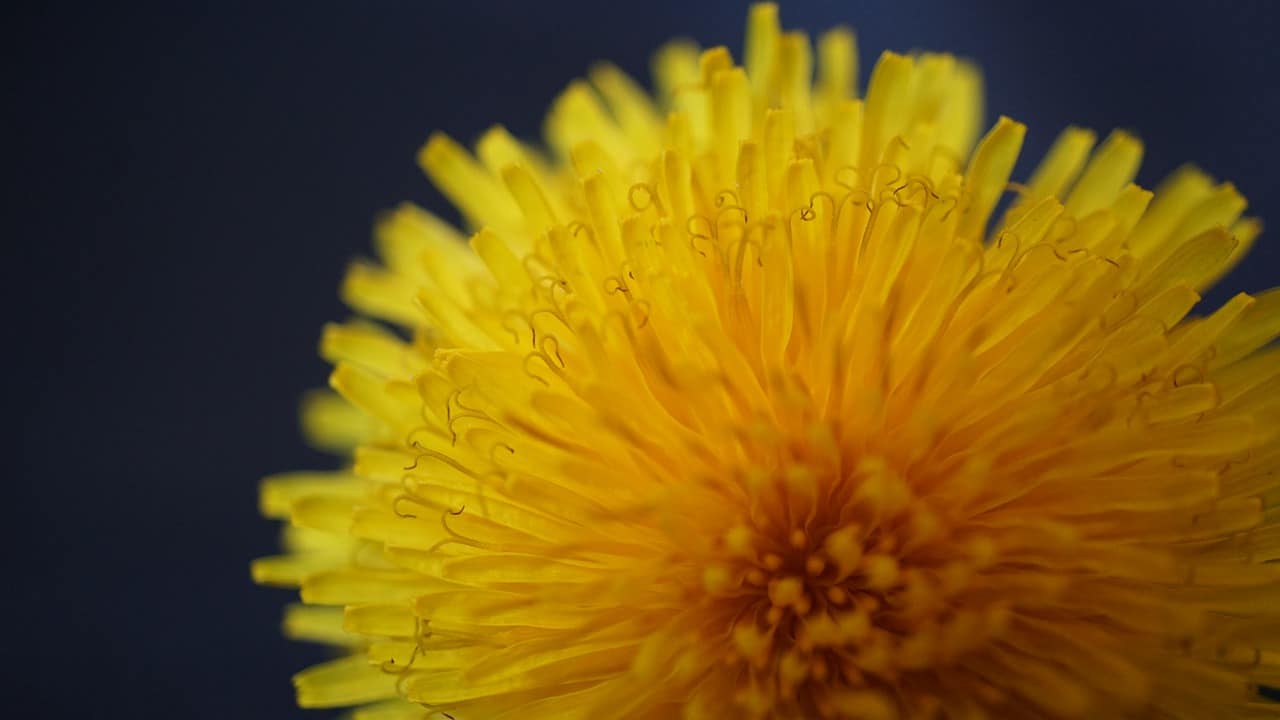
Summary
When I was young I loved finding dandelions that have gone to seed. I’d pull up the stem, close my eyes, make a wish and blow the seeds through the air. For the latter part of my life, I spent years ripping dandelions out of my yard. My life was spent in one way or another wasting dandelions. Until the last few years when I realized how nutritious they are.
Impossible to believe a weed. A yellow leafy plant that we have worked so hard to destroy is an actual herbal remedy for many ailments. But, it is! One of the few herbs that can be used in totality. Every part of the dandelion plant can be used for health benefits.

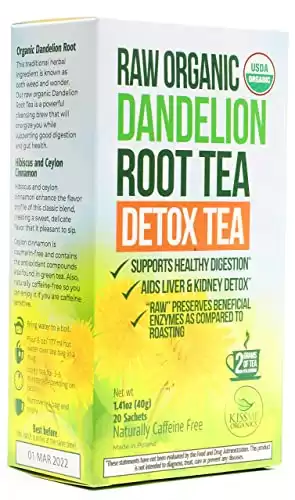
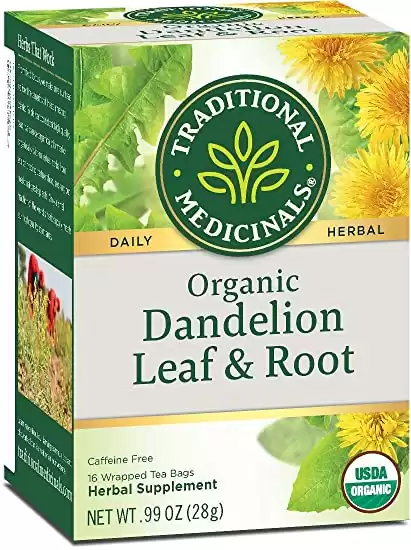
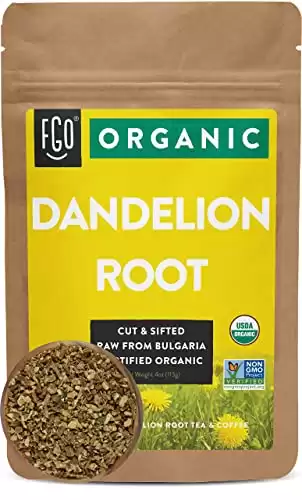
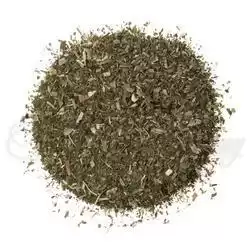

1 thought on “What Is Dandelion Tea Good For?”
Pingback: Health Benefits Of Herbal Tisanes - My Tea Vault